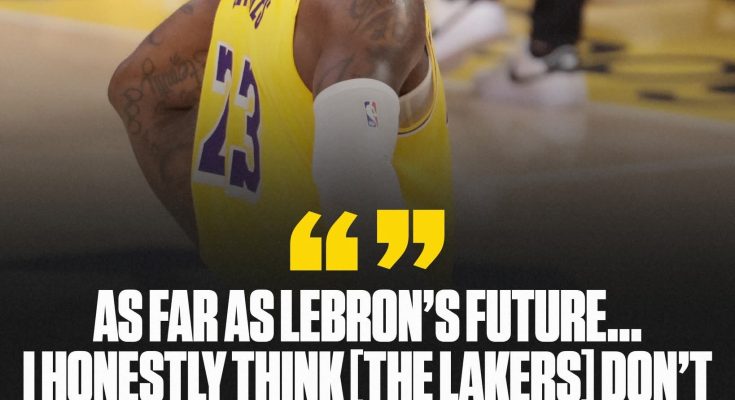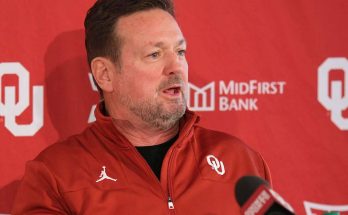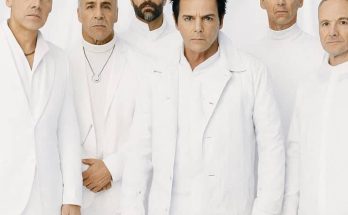LeBron James, one of the most iconic and influential basketball players in the history of the sport, is approaching a milestone that many athletes in his field rarely reach with such sustained excellence. As he prepares to turn 41 in December, the significance of this moment extends far beyond just the number itself. It’s a testament to his longevity, his resilience, and his incredible ability to adapt and evolve in a game that has become faster, more physical, and increasingly demanding over the years.
When LeBron entered the NBA straight out of high school back in 2003, he was immediately recognized as a generational talent. His combination of size, athleticism, skill, and basketball IQ was unparalleled, and from the very beginning, it was clear that he was destined for greatness. Over the past two decades, he has amassed a legacy that few can rival — four NBA championships, four MVP awards, countless All-Star appearances, and an indelible impact on and off the court. But now, as he nears the age where most players have long since retired or faded from prominence, LeBron is still performing at a high level, defying expectations and rewriting what it means to age as a professional athlete.
The fact that LeBron is still a dominant force at 40 and beyond is remarkable not only because of the physical demands of basketball but also because of the mental and emotional toll that comes with such a long career. Injuries, changes in teams, shifting roles, and the constant pressure to perform at an elite level would have sidelined many players much earlier. Yet, LeBron has managed to avoid significant setbacks that could derail his career. His dedication to fitness, nutrition, and recovery is well-documented and often cited as a key reason why he has been able to sustain such a long run at the top. He has embraced new training techniques, hired top trainers, and invested heavily in his body’s care, treating it almost like a temple.
LeBron’s impact isn’t limited to his physical prowess. He has also demonstrated an extraordinary ability to adapt his game over the years. Early in his career, he was known for his explosive athleticism and ability to dominate with sheer force and speed. As he aged, he refined his skill set, becoming a more efficient shooter, a smarter passer, and a more strategic player overall. His basketball IQ is off the charts, and he understands the nuances of the game in a way that few do. This intellectual growth has allowed him to remain relevant even as the younger generation of players brings fresh energy and different styles to the league.
Moreover, LeBron’s leadership both on and off the court has played a critical role in his sustained success. He has been a mentor to younger players, helping to cultivate new talent and foster team chemistry. His ability to inspire and motivate those around him speaks to his character and vision for the game. He understands the importance of building a winning culture and has been instrumental in the success of every team he has been a part of. This leadership extends beyond basketball as well — LeBron has used his platform to speak out on social justice issues, advocate for education through his foundation, and become a role model for millions around the world. His influence transcends sports, making his longevity even more significant because it amplifies the positive impact he continues to have.
As LeBron approaches 41, there’s also a broader cultural and historical context to consider. Few players in NBA history have been able to sustain such a high level of play into their late 30s and beyond. Players like Kareem Abdul-Jabbar, Michael Jordan (who came back from retirement), and Karl Malone all had extended careers, but even among those legends, LeBron stands out for the combination of durability, productivity, and consistency. The modern NBA is more physically demanding and faster-paced than ever before, which makes his longevity even more impressive. It challenges traditional assumptions about aging in professional sports and sets a new standard for what’s possible.
The anticipation around LeBron turning 41 also highlights the way fans and analysts view him not just as a player, but as an enduring symbol of excellence. Every game he plays is scrutinized and celebrated, with people eager to see how he performs against younger competitors who represent the future of the league. There’s a narrative that he is chasing history, perhaps aiming to add to his championship tally or to climb even higher on the all-time scoring list. Each milestone he reaches adds another chapter to his storied career and reinforces his place in the pantheon of basketball greats.
It’s fascinating to consider how LeBron’s career longevity impacts the younger generation of players. For many up-and-coming athletes, LeBron is not just a competitor but also a blueprint for success. His work ethic, professionalism, and ability to maintain peak performance over such an extended period offer lessons in perseverance and dedication. Younger players see that greatness isn’t just about raw talent but also about how you take care of yourself, how you evolve your game, and how you handle the pressures that come with being in the spotlight.
The conversations around LeBron turning 41 often touch on what this means for the future of his career. Will he continue playing for several more years? Can he keep up this level of performance as his body inevitably changes? These questions underscore the uncertainty and intrigue that come with being an athlete at this stage of life. Yet, if history is any indicator, LeBron is likely to continue defying expectations. His track record suggests he won’t be satisfied with merely existing on the roster; he wants to compete, to win, and to contribute meaningfully to his team’s success.
This milestone also prompts reflection on the broader evolution of basketball. LeBron’s career has spanned multiple eras — from the early 2000s, when the game was more physical and less reliant on three-point shooting, to the current era dominated by pace, space, and long-range shooting. He has been a constant presence through these shifts, adapting his style and influencing the game’s development. His ability to remain relevant across different basketball landscapes speaks to his versatility and understanding of the sport.
Off the court, LeBron’s influence is just as profound. He has built a media empire, ventured into acting and producing, and created opportunities for others through his business ventures. His role as a cultural icon means that turning 41 is not just about his basketball career but also about his broader legacy. He embodies the idea that an athlete’s impact can extend well beyond the playing field, shaping culture, inspiring communities, and opening doors for future generations.
LeBron’s journey to this age milestone is also a story of overcoming challenges. Throughout his career, he has faced criticism, scrutiny, and immense pressure. Whether it was the early doubts about his ability to lead a team to a championship or the backlash he received for his decisions off the court, he has always managed to rise above and prove his critics wrong. This resilience is a hallmark of his career and a key reason why he remains relevant and respected as he approaches 41.
The anticipation of his 41st birthday is more than just a countdown; it’s a celebration of a career that has inspired countless fans and players alike. It’s a reminder of the power of determination, the importance of adaptability, and the impact of leadership. LeBron James turning 41 is a historic moment in sports, reflecting not only his personal achievements but also the evolution of basketball and the broader cultural significance of athletes in today’s world.
Looking ahead, the story of LeBron’s career will continue to unfold, and his 41st year will likely add new chapters of success, challenge, and inspiration. Fans will watch closely to see how he balances the physical demands with his experience, how he mentors the next generation, and how he continues to influence the game. Regardless of what the future holds, reaching this age while still competing at an elite level is an extraordinary accomplishment — one that cements LeBron James as one of the greatest athletes not just of his generation, but of all time.



